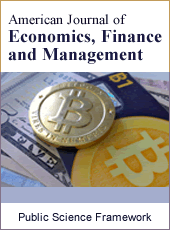American Journal of Economics, Finance and Management
Articles Information
American Journal of Economics, Finance and Management, Vol.3, No.5, Oct. 2017, Pub. Date: Dec. 9, 2017
Empowering the Indonesian Post-Migrant Workers
Pages: 42-45 Views: 2288 Downloads: 671
[01]
Stevany Hanalyna Dethan, Faculty of Economic, Mahasaraswati University of Mataram, Mataram, Indonesia.
[02]
Nenet Natasudian Jaya, Faculty of Economic, Mahasaraswati University of Mataram, Mataram, Indonesia.
Due to have big remittance as a significant national devisa, the Indonesian post-migrant workers becomes an important social issue that needs to get noticed seriously both from the government and society. But their income from working abroad is used to pay the debt they had used to finance their departureand/or often to buy consumptive goods. In consequence, the economic problem comes as they no longer going abroad for work (post-migrant worker); since they have no productive economic activities. This research aims to provide alternative empowerment for the post-migrant workers carry out economic activities in the country. The research was conducted in West Lombok, West Nusa Tenggara Province. The method used by triangulation techniques, combined qualitative with quantitative methods. The results of this study is the number of workers who are not able to take advantage of after-work abroad in the form of salary / wages and technical experience and mental courage to accept the risk, due to the lack of technical guidance both before and after completion of work contract. Utilization of remittances has a very significant impact, both for the improvement of the welfare of migrant workers and their families and the community through efforts perluasana employment opportunities. Therefore, it provides knowledge about entrepreneurship becomes important for workers and their families so that remittances can be harnessed for productive ventures.
Empowerment, Post-Migrant Workers, Entrepreneurship, West Lombok
[01]
Anonim, 2012. Definition, Purpose, and Entrepreneurship Theory: Lecture Material.
[02]
Anonim, (2016). West Lombok in Figures-2015. BPS-Statistic of West Lombok.
[03]
Bank Indonesia NTB, 2008. Report of the National Survey of Remittance Patterns workers in West Nusa Tenggara.
[04]
BNP2TKI, 2007. Delivered in Public Expose Achievement 100 Weekdays of BNP2TKI. Jakarta.
[05]
Jaya, N. N., 2015. Entrepreneurship Model of Post-Migrant Workers Empowerment in West Lombok. American Journal of Business & Society. 1(1). 8-12.
[06]
Jonson, G. L., 1986. Research Methodology For Economist, Philosophy and Practics. McMillan Publishing, London.
[07]
Kartasasmita, Ginanjar. 2003. Community Empowerment. Concept Development Rooted in Community. Lecture materials of Development Studies 605 Post-Graduate Program of ITB 1st December, 2003.
[08]
Leon, J. A., Gorgievski, M., &Lukes, M. (2008, July). Teaching Psychology of Entrepreneurship. Retrieved July 27, 2017, from Universidad Nacional De Educacion a Distancia, Madrid.
[09]
Riza, Dra. Risyanti, Drs. H. Roesmidi, MM.2006. Community Empowerment. Sumedang: AlqaprintJatinangor.
[10]
Romidiati, Haning. 2003. Indonesian Labour Migration to Malaysia: Recruitment and The management, Population and Development, Edition XII No.2, Jakarta.
[11]
Singarimbun, M&Sofian Effendi. 1999. Survey Research Methods. LP3ES Jakarta.
[12]
Sya'roni, D. A., & Sudirham, J. J. (2012). Kreativitas Dan Inovasi Penentu Kompetensi Pengusaha Kecil. Jurnal Manajemen Teknologi, 42-59.

ISSN Print: 2381-6864
ISSN Online: 2381-6902
Current Issue:
Vol. 5, Issue 3, September Submit a Manuscript Join Editorial Board Join Reviewer Team
ISSN Online: 2381-6902
Current Issue:
Vol. 5, Issue 3, September Submit a Manuscript Join Editorial Board Join Reviewer Team
| About This Journal |
| All Issues |
| Open Access |
| Indexing |
| Payment Information |
| Author Guidelines |
| Review Process |
| Publication Ethics |
| Editorial Board |
| Peer Reviewers |


